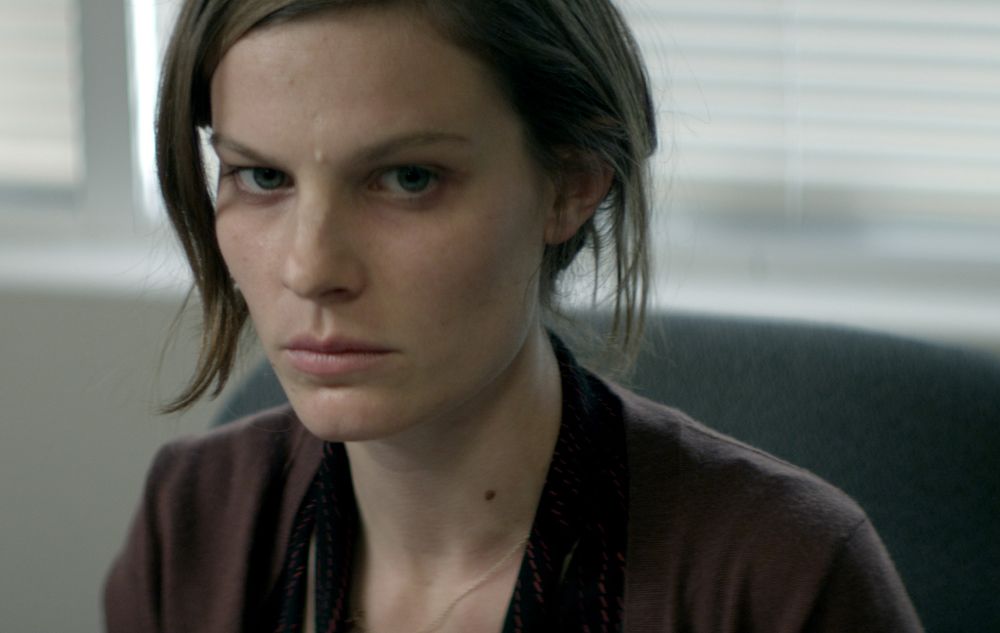Lindsay Burdge’s Transgression

ABOVE: LINDSAY BURDGE IN A TEACHER
An affair between a teacher and a student is hardly a light subject matter, but Hannah Fidell’s sophomore film A Teacher is a particularly bleak portrayal. Young, attractive, and well-liked, Diana teaches high school English in an Austin suburb. Some time before the film begins, Diana begins sleeping with one of her students—a 17-year-old named Eric. Fidell is less interested in the sordid details of their relationship, however, than the decay of Diana: the personal problems that lead to this transgression, and how she loses touch with all sense of self as she becomes more involved with the almost adult Eric.
As Diana, Tisch-trained actress Lindsay Burdge makes the film. Her performance is understated, yet heartbreaking—a study 0f the disintegration of a spirit and hopeless vulnerability that ensues.
EMMA BROWN: A Teacher premiered at Sundance last January and a lot of the reviews singled out your performance as a “breakout performance.” Do you feel like things have changed for you since the film first screened?
LINDSAY BURDGE: They have changed in a way. For one thing, I signed with ICM and now I have a team around me to help me out—help me make decisions—and also make sure that I’m able to read scripts that I never had access to before, so that’s different. Also I’m talking to you—that’s a new thing. [laughs]
BROWN: I’m sure that part will get old fairly quickly. Before the film begins, Diana and Eric cross a line. Did you discuss how and when this happened when you were preparing for the film?
BURDGE: Yeah. Hannah [Fidell] deliberately left that out of the film because she wanted to focus on a really specific moment in their relationship. But Hannah and I discussed at length how that would go down and also Will, who plays Eric, and I discussed it over email. Based on the things I’ve read, it’s usually [that] the teacher leaves open a window of opportunity and the student then crosses the line, which sort of absolves the teacher of some sense of responsibility.
BROWN: Do you think that Diana in love with Eric?
BURDGE: I think that Diana definitely feels herself in love with him at some point. I don’t think that she does at the beginning. But I think, in spite of herself, she begins to feel that way—perhaps even more when she realizes she’s losing him.
BROWN: There were quite a few films at Sundance this year about relationships between older women and teenage boys—Adore and The Lifeguard, for example.
BURDGE: I know. I haven’t gotten to see either one.
BROWN: I would recommend Adore. Why do you think there’s this sudden proliferation?
BURDGE: I don’t know. I’m not sure if people are just interested in female sexuality at the moment—repressed female desire. There’s a way that ideas seem to come around—a collective unconscious or something. I mean, we had no idea that these other films were being made. It is kind of funny that they all happened at the same time.
BROWN: There’s definitely a stereotype of the sort of female student that would have an affair with a teacher or a professor—and the sort of male teacher who would have an affair with a student. When the gender roles are reversed, do you think there’s the same sense of the professor as the predator?
BURDGE: No—that’s why we were able to make this movie. I don’t think that we could have gotten away with making this movie with the genders reversed and we’re quite aware of that. For whatever reason, and I think there are real reasons, it’s a little bit more of a gray area. She’s close to his age. Boys at the age of 17 are totally sexualized—you are a sexual being by the time you’re 17 years old. And so in one year’s time, if they weren’t student-teacher, it would be a completely acceptable relationship by legal standards. Obviously there are ethics to being a teacher, and if you’re in that position of authority, regardless of your gender or the age of your students, you just don’t cross that line. There needs to be a boundary there for the student-teacher relationship to be intact.
BROWN: What would you say to Diana if she were your friend?
BURDGE: Oof. Poor thing! [laughs] She would need to be honest with me with what was going on with her, which I don’t think she was with anyone. If I knew her, hopefully I would be able to see that she was going through something very intense. I think I would tell her that she could do better—I’d maybe tell her to go to therapy, call her mom, tell me everything that was going on, and to stop calling that boy! [laughs]
BROWN: I thought one of the saddest moments was when Diana started reminiscing about her high school boyfriend.
BURDGE: It’s a sad thing; she never really progressed past a certain point. You just know with these women that something very painful happened to them along the way that made them very vulnerable, and then they’re put in a position where they have more power than the realize that they do—or more power than they really should. For me, the reason why I was so interested in this story—it’s the same thing that happens to me when I read the news—my heart kind of breaks for everyone involved, not just the victims. The victims, that’s what the news is trying to tell you‚—”Look what happened to these poor people”—and that’s obvious and we all understand that. But what I’m also interested in is what is happening to this person who is doing this thing. What kind of situation do they have to be in in order for this to happen. It’s really sad. I feel like, more often than not, people aren’t inclined to think of them that way.
BROWN: Do you think that everyone is salvageable?
BURDGE: I think that everyone deserves compassion and love. I don’t know if everybody is salvageable, some of the most sensitive and brilliant people get completely lost and we lose them entirely, like David Foster Wallace. This is so heavy!
BROWN: This is quite an intense film and you’re in every scene. Was it difficult to get out of character at the end of the day?
BURDGE: Yeah. It was pretty difficult, to be honest. [laughs] I think one way that I relate to Diana is that I’m kind of an obsessive person—I’m kind of an intense person. Once I got into that mode, it wasn’t too easy to shake. I certainly spent a lot of my time off camera recuperating from whatever happened that day, or just digging into whatever the next thing would be. It was a pretty all-encompassing shoot and I think everybody who was involved with it was really immersed in that energy. It was definitely tough—I can’t deny that—because I think we were really trying to get into this woman’s head and she’s not doing so well.
BROWN: Did you have a go-to method of recuperation?
BURDGE: Well the wonderful thing was that I was making this movie with friends, really good friends. I was living with this woman Lanie, who did my hair and makeup and wardrobe, and the DP—we were all living in his house in Austin. We would go eat at a diner or something like that and try to chill a bit back at the house. Sometimes we would get the local Austin paper and play a game where we would look at the paper to see all the convicts—for some reason they have the most recent arrests. That’s a very strange thing to do to relax, but whatever it takes.
BROWN: This is your second film with Hannah, she also directed you in her debut We’re Glad You’re Here (2010). Did you know her before We’re Glad You’re Here?
BURDGE: I did. I met Hannah at RSA, which is Ridley Scott’s production company. She was working at the front desk, and my boyfriend was a director there, and also I produced for him, so we just came to be friends while working in the office together. When she decided to make a movie, I was the only actress she knew, so that was a very lucky thing. The first movie was really kind of a learning experience for her and for me and between the first movie and the second movie, she really grew tremendously as a filmmaker—she really knew what she wanted and she assembled a group of people she could really trust. I think she also realized that she could ask a lot more of her actors. When we did the first movie, it was much more in the mumblecore vein and it was sort of light, whereas this one she really wanted to go there—and that was a challenge that we were both happy to take on.
BROWN: You’ve also worked as a casting director in the past. Did it give you an idea of what not to do in auditions?
BURDGE: No, not really. In an audition, you’re waiting for the right person to come along and grab you and everybody else kind of falls away at that point.
BROWN: Does knowing that make it easier when you don’t get a role?
BURDGE: Totally. I know that there’s a perfect person for every role, and you’re not going to be right for every role. Sometimes there’s this perception, “Oh, I can play anything.” I don’t think that’s true and I wouldn’t want that to be true. I don’t think I can play everything—I think I can do a lot of different things, but I don’t think any one person should be in every role.
A TEACHER IS OUT NOW IN LIMITED RELEASE.






